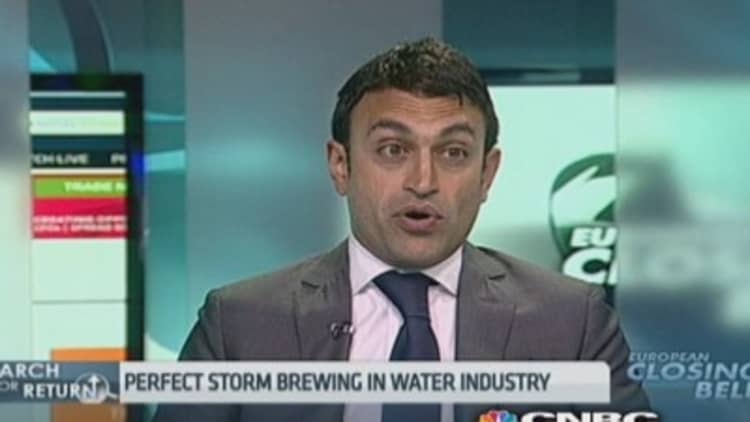Some call it dowsing, water witching or divining. Others call it flaky.
Whatever it's called, the ancient method of discovering water underground is finding new life in drought-ridden states such as California.
"I've found a least eight wells for our vineyard, and hundreds of wells for farmers and homes," said Marc Mondavi, who not only helps run the family-owned Charles Krug Winery in California's Napa Valley, but is also a dowser for hire.
Read MoreWhy your water bill will likely increase
The 59-year-old Mondavi said he's been dowsing for 40 years, but the extreme drought in the Golden State is generating at least 50 percent of his customer base these days.
California is now in its third year of severe drought. Mondavi claims that the state hasn't developed any new water sources since the 1960s, so the calls for dowsing are only increasing.
A method that's 5,000 years old
Dowsing is the technique of searching for underground water, or even minerals or oil, by observing the motion of a pointer. The pointer can be a forked stick, or bent wires or brass rods. They are often referred to as divining rods.
Dowsers walk over a parcel of land and let the rods guide them to a spot or spots where water lies underground.
Not all dowsers use rods.There's no official certification for the process, and while it can be taught, anyone can call themselves a dowser. And they don't actually drill for the water.
The practice goes back at least 5,000 years, say experts. There's even a group dedicated to promoting and teaching the practice, called the American Society of Dowsers.
What makes a good dowser is listening to what nature is telling you, said 68-year-old Gregory Storozack of Edgewater, Colorado, who's been dowsing for 32 years.
"For me, it's knowing that when you are over a target, it's just there," said the retired municipal recreation worker.
Bill Getz of Schoharie, New York, said he's found more than 1,000 water wells, locating his first at the age of 13.
"I use an apple or willow Y branch," said the 71-year-old, who's retired from his job at the New York state education department. "I look for where water accumulates."
Skeptics doubt it
The cost of dowsing can vary. Some dowsers offer their services for free and just want their expenses covered. Others ask only for donations. Mondavi said he charges $500 per site visit.
Dowsers don't offer guarantees of finding water, but most stand by their work.
"I missed on a well once, and that was a long time ago," Mondavi said.
However, skeptics of the method, who often include professional water drillers, say there's little scientific basis behind dowsing.
Read MoreWhy so many Americans don't care about the drought
The United States Geological Society said in a report about dowsing that what accounts for "successful" water dowsing is that in "many areas underground water is so prevalent close to the land surface that it would be hard to drill a well and not find water."
"I thought it was the biggest bunch of bull I ever heard in my life," said Greg Storozack, who explained that it was his cousin who turned him on to the practice in an effort to find water for the family years ago. "I tried it, and I pictured an underground stream in my mind, and I started walking and the rods opened up. We found water."

As for the drought that's roasting much of the Southwest, Storozack said he's working on getting dowsers from across the country to offer their services to towns and ranches in the hardest hit areas.
He would ask only that their expenses be covered.
Bill Getz, who said he's not against the idea, would prefer to see dowsers get paid for their services. Getz charges around $300 plus travel time.
Read MoreWinning the agriculture tech war
"It makes it more legitimate in people's minds if our services are compensated," he argued.
Krug Winery's Mondavi said the agricultural community has always believed in dowsing—but more so now in what seems to be a never-ending drought.
"Most farmers won't drill a well unless a dowser has been there," he said.
—By CNBC's Mark Koba


